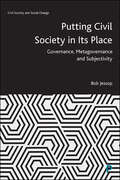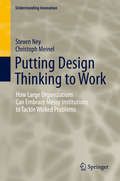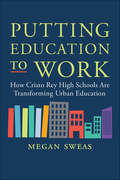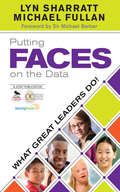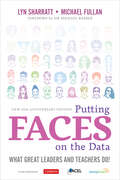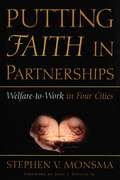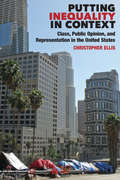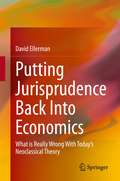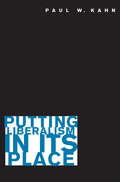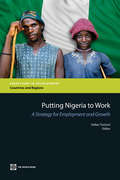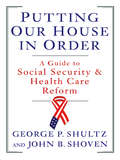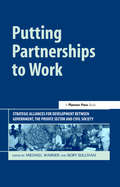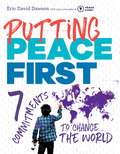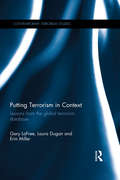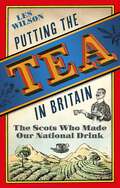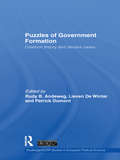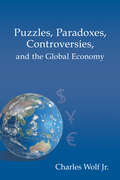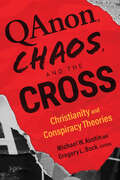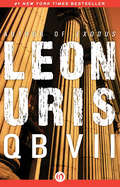- Table View
- List View
Putting Civil Society in Its Place: Governance, Metagovernance and Subjectivity (Civil Society and Social Change)
by Bob JessopRenowned social and political theorist Bob Jessop explores the idea of civil society as a mode of governance in this bold challenge to current thinking. Developing theories of governance failure and metagovernance, the book analyses the limits and failures of economic and social policy in various styles of governance. Reviewing the principles of self-emancipation and self-responsibilisation it considers the struggle to integrate civil society into governance, and the power of social networks and solidarity within civil society. With case studies of mobilisations to tackle economic and social problems, this is a comprehensive review of the factors that influence their success and identifies lessons for future social innovation.
Putting Design Thinking to Work: How Large Organizations Can Embrace Messy Institutions to Tackle Wicked Problems (Understanding Innovation)
by Christoph Meinel Steven NeyThis book discusses how the methods and mindsets of design thinking empower large organizations to create groundbreaking innovations. Arguing that innovations must effectively tackle so-called “wicked problems,” it shows how design thinking enables managers and innovators to create the organizational spaces and practices needed for breakthrough innovations. Design thinking equips actors with the tools and methods for harnessing the creative tensions inherent in pluralist, often conflicting disciplinary approaches. This, however, requires the transformation of contemporary organizational cultures away from monolithic, integrated models (or identities) toward more pluralist, dynamic and flexible institutional identities. Based on real-world cases from a wide range of organizations around the globe, the book offers managers and innovators practical guidance on initiating and managing the cultural transformations required for effective innovation.
Putting Education to Work: How Cristo Rey High Schools Are Transforming Urban Education
by Megan SweasThe story of how The Cristo Rey Network’s values-based education model and revolutionary work study program have improved urban schools and inspired education reform across the nation.Combining the latest advancements in instruction, a focus on spiritual values and character development, and an innovative work-study program, the Cristo Rey Network has reinvented urban education and revived a broken system. Catholic school for the twenty-first century, Cristo Rey offers underprivileged students the opportunities they deserve and the structure and committed teachers they need to succeed and build a better life.Filled with amazing stories of hardship and transformation, Putting Education to Work is a testimonial to the effectiveness of the Cristo Rey program, demonstrated through the lives of its students. Thanks to its rigorous college-prep curriculum and real-life job experience, students become “lifelong learners” who graduate with critical thinking skills and the experience needed for college and the work force. But the Cristo Rey education is not limited to the mind. Focusing on character growth, it ensures the formation of a “whole person” who understands his or her role in helping others.Presenting the lessons learned along the way, Putting Education to Work shows how any school—religious or secular—can benefit from the Cristo Rey model and offers a hopeful outlook of what young people and determined educators can achieve together.
Putting FACES on the Data: What Great Leaders Do!
by Michael Fullan Lyn D. SharrattBuild the bridge from data collection to improved instruction Students are people—not data. How can you use assessment data to focus on reaching every student? This book shows how to develop a common language for sharing all students’ progress with all teachers and leaders, and how to use ongoing assessment to inform instruction. Based on worldwide research of more than 500 educators, the book presents solutions organized by: Assessment Instruction Leadership Ownership The many benefits of personalizing data include increased student engagement and a positive impact on school culture. This reader-friendly guide helps you set goals, adjust lessons, identify students’ strengths and weaknesses, and implement interventions.
Putting FACES on the Data: What Great Leaders and Teachers Do!
by Michael Fullan Lyn D. SharrattWhen numbers become people, learners thrive Waves of data—indigestible, dehumanized, and disaggregated—are crashing into the education system every day, driving you to distraction. But imagine a world where you’re not being drowned by data, but inspired by it; where that data has a FACE and gives you focused information on how to reach every student. Sharratt and Fullan turn worldwide research into a road map for school leaders to use ongoing assessment to inform instruction and drive equity at the classroom, school, district, and state levels. Inside you will find A fresh look at data to incorporate new learning Updated case studies, figures, and vignettes Insights from more than 500 educators in answering the 3 research questions: Why do we put FACES on data? How do we put FACES on data? and What are the top three leadership skills needed to do this work? An integrated approach to using the 14 Parameters to enhance Deep Learning and critical thinking Tools for committing to "equity and excellence" FACES is about setting up the conditions for success in every classroom: identifying the right factors, at the right time, with the right resources. Its focus on student-centered data will help you: Increase learners’ growth and achievement improve engagement that results in students, teacher and leader empowerment build cultures of learning drive a learning environment of continuous improvement
Putting FACES on the Data: What Great Leaders and Teachers Do!
by Michael Fullan Lyn D. SharrattWhen numbers become people, learners thrive Waves of data—indigestible, dehumanized, and disaggregated—are crashing into the education system every day, driving you to distraction. But imagine a world where you’re not being drowned by data, but inspired by it; where that data has a FACE and gives you focused information on how to reach every student. Sharratt and Fullan turn worldwide research into a road map for school leaders to use ongoing assessment to inform instruction and drive equity at the classroom, school, district, and state levels. Inside you will find A fresh look at data to incorporate new learning Updated case studies, figures, and vignettes Insights from more than 500 educators in answering the 3 research questions: Why do we put FACES on data? How do we put FACES on data? and What are the top three leadership skills needed to do this work? An integrated approach to using the 14 Parameters to enhance Deep Learning and critical thinking Tools for committing to "equity and excellence" FACES is about setting up the conditions for success in every classroom: identifying the right factors, at the right time, with the right resources. Its focus on student-centered data will help you: Increase learners’ growth and achievement improve engagement that results in students, teacher and leader empowerment build cultures of learning drive a learning environment of continuous improvement
Putting Faith in Partnerships: Welfare-to-Work in Four Cities
by Stephen V. MonsmaPutting Faith in Partnerships addresses a major conceptual change in American domestic policy, begun by Reagan and now fully realized by the Bush administration: the shift of responsibility for social services from the federal government to states and communities. In this groundbreaking study of a politically controversial topic---the debut offering in Alan Wolfe's Contemporary Political and Social Issues series---author Stephen Monsma avoids overheated rhetoric in favor of a careful, critical analysis of the hard evidence on whether public-private partnerships really work. The book is based on in-depth studies of social service programs in Los Angeles, Chicago, Philadelphia, and Dallas. By examining public-private partnerships between government offices and nonprofit organizations, Monsma seeks to understand how these partnerships affect the balance between government's efforts to deal with social problems and the rights of individual citizens to control their own lives.
Putting Inequality in Context: Class, Public Opinion, and Representation in the United States
by Christopher EllisRising income inequality is highlighted as one of the largest challenges facing the United States, affecting civic participation and political representation. Although the wealthy often can and do exert more political influence, this is not always the case. To fix political inequality, it is important to understand exactly how class divisions manifest themselves in political outcomes, and what factors serve to enhance, or depress, inequalities in political voice. Christopher Ellis argues citizens’—and legislators’—views of class politics are driven by lived experience in particular communities. While some experience is formally political, on an informal basis citizens learn a great deal about their position in the broader socioeconomic spectrum and the social norms governing how class intersects with day-to-day life. These factors are important for policymakers, since most legislators do not represent “the public” at large, but specific constituencies. Focusing on U.S. congressional districts as the contextual unit of interest, Ellis argues individuals’ political behavior cannot be separated from their environment, and shows how income’s role in political processes is affected by the contexts in which citizens and legislators interact. Political inequality exists in the aggregate, but it does not exist everywhere. It is, rather, a function of specific arrangements that depress the political influence of the poor. Identifying and understanding these factors is a crucial step in thinking about what reforms might be especially helpful in enhancing equality of political voice.
Putting Jurisprudence Back Into Economics: What is Really Wrong With Today's Neoclassical Theory
by David EllermanThis book presents an integrated jurisprudential critique of neoclassical microeconomic theory. It explains what is ‘really wrong’ with the theory both descriptively, as well as normatively. The criticism presented is based on questions of jurisprudence, and on neoclassical theory’s sins of omission and commission concerning the underlying system of property and contract. On the positive side - while the presentation is almost entirely non-mathematical - the book contains the first mathematical treatment of the fundamental theorem about property and contract in jurisprudence that underlies a market economy.The book follows the tradition of John Stuart Mill as the last major political economist who considered the study of property rights as an integral part of economic theory. The conceptual criticisms presented in this book focus on the descriptive and normative misconceptions about property and contracts that are deeply embedded ideology in neoclassical economics, not to mention in the broader society. The book recognizes that the idealized microeconomic theory is not descriptive of reality and focuses its criticism on conceptual mistakes in the theory, which are even clearer due to the idealized nature of the theory. Therefore, the book is a must-read for scholars, researchers, and students interested in a better understanding of jurisprudence in economics, neoclassical microeconomic theory, and political economy in general.
Putting Liberalism in Its Place
by Paul W. KahnIn this wide-ranging interdisciplinary work, Paul W. Kahn argues that political order is founded not on contract but on sacrifice. Because liberalism is blind to sacrifice, it is unable to explain how the modern state has brought us to both the rule of law and the edge of nuclear annihilation. We can understand this modern condition only by recognizing that any political community, even a liberal one, is bound together by faith, love, and identity. Putting Liberalism in Its Place draws on philosophy, cultural theory, American constitutional law, religious and literary studies, and political psychology to advance political theory. It makes original contributions in all these fields. Not since Charles Taylor's The Sources of the Self has there been such an ambitious and sweeping examination of the deep structure of the modern conception of the self. Kahn shows that only when we move beyond liberalism's categories of reason and interest to a Judeo-Christian concept of love can we comprehend the modern self. Love is the foundation of a world of objective meaning, one form of which is the political community. Arguing from these insights, Kahn offers a new reading of the liberalism/communitarian debate, a genealogy of American liberalism, an exploration of the romantic and the pornographic, a new theory of the will, and a refoundation of political theory on the possibility of sacrifice. Approaching politics from the perspective of sacrifice allows us to understand the character of twentieth-century politics, which combined progress in the rule of law with massive slaughter for the state. Equally important, this work speaks to the most important political conflicts in the world today. It explains why American response to September 11 has taken the form of war, and why, for the most part, Europeans have been reluctant to follow the Americans in their pursuit of a violent, sacrificial politics. Kahn shows us that the United States has maintained a vibrant politics of modernity, while Europe is moving into a postmodern form of the political that has turned away from the idea of sacrifice. Together with its companion volume, Out of Eden, Putting Liberalism in Its Place finally answers Clifford Geertz's call for a political theology of modernity.
Putting Nigeria to Work: A Strategy for Employment and Growth
by Volker TreichelPublic debate in Nigeria on the country's progress since its return to democracy in 1999 has been dominated by two seemingly opposite themes. The first theme is the strong growth performance of the non-oil economy. This success has been marked by sharp increases in agriculture, trade, and construction and by the emergence of new industries in the financial, telecommunications, and entertainment sectors, supported by sound macroeconomic policies and structural reforms. The second, opposing theme is the seeming failure of Nigeria's much improved economic performance to reduce unemployment, especially among the young. Rising levels of unemployment have increased militancy among the young and impacted negatively on public order. 'Putting Nigeria to Work: A Strategy for Employment and Growth' looks at the ways in which Nigeria's improved economic performance has impacted the labor market. A number of relevant factors are carefully examined and analyzed, including industrial policy and the investment environment, the effects of restrictive trade policies on growth, and the ability of the technical and vocational education system to address the country's skills gap. The book proposes a strategy that will allow Nigeria to increase the availability of quality jobs, reduce rising youth unemployment, and sustain and further accelerate the country's economic performance and growth. At the core of this strategy are targeted interventions aimed at removing binding constraints to growth in sectors of the economy that are already growing fast, but have the potential to grow faster and have significant employment-creating potential.
Putting Our House in Order: A Guide to Social Security and Health Care Reform
by George P. Shultz John B. ShovenA former U.S. Secretary of the Treasury and an eminent economist tackle the biggest social issue of our time. Of all the issues swirling around the 2008 election, the staggering projected costs for the upkeep of America's largest entitlement programs--Social Security, Medicare, and Medicaid--loom with gathering intensity. Government revenues alone cannot solve the problem, but a solution must be found. In this book George P. Shultz and John B. Shoven take a practical--and optimistic--look at the issues at hand, offering an agenda for reform that will make these essential programs solvent. Drawing on a trove of original research, they take stock of the current situation, consider plans on offer from major thinkers in the field, and chart a course toward a system that provides income for the elderly and universal access to health care in ways that are fiscally sound. This book is a must-read for anyone looking to make an informed decision about the country's future.
Putting Partnerships to Work: Strategic Alliances for Development between Government, the Private Sector and Civil Society
by Michael Warner Rory SullivanThe World Summit on Sustainable Development in Johannesburg clearly identified the corporate sector as one of the key actors in the delivery of national and international poverty reduction targets in developing countries. "Partnerships" between government, civil society and business were proposed as one means whereby these poverty reduction targets were to be achieved. Despite the rhetoric, there was less consideration of how such partnerships could work in practice, the outcomes that could be achieved, or the relative merits of partnerships over other, more traditional approaches to development. This book is about partnerships between the private sector, government and civil society. Its objective is to share practical experiences in establishing and implementing such partnerships and to show how partnerships work. The focus is on the oil, gas and mining industries, as these sectors have tended to be the primary drivers of foreign investment in developing countries. These corporations increasingly operate in regions characterised by poor communities and fragile environments. The more effective use of external relationships to ensure the effective contribution of these investments to poverty reduction and local environmental management is critical, for the companies, for government, and for the poor. Putting Partnerships to Work is based on the work of the Secretariat of the Natural Resources Cluster (NRC) of Business Partners for Development (BPD). This major research programme, which ran from 1998 to 2002, aimed to enhance the role of oil, gas and mining corporations in international development. The programme objective was to produce practical guidance, based on the experience of specific natural resource operations around the world, on how partnerships involving companies, government authorities and civil-society organisations can be an effective means of reducing investment risks and of promoting community and regional development. The programme encompassed partnerships in Colombia, Nigeria, India, Venezuela, Bolivia, Zambia, Azerbaijan, Indonesia and Tanzania. The specific projects that were implemented included not only "traditional" development projects such as the provision of water, healthcare or infrastructure but also themes as diverse as conflict prevention, regional development, micro-enterprise development and managing oil spill compensation. Based on the experience of establishing and implementing effective partnerships, the NRC identified good practice, and developed replicable guidelines, tools and training materials. This book is not only about good practice; it presents both the positive outcomes and lessons from the programme, as well as the risks and costs, and where things went wrong. It also provides evidence not only of the viability of partnerships (i.e. that partnerships "can work") but also evidence that partnership approaches can provide substantially better outcomes for all parties than can more traditional approaches to development or corporate social responsibility. For example, a road in India was constructed at 25% of the cost to government; it took just 11 months for a community health centre in Venezuela to become operational and with its long-term financial future assured; and primary education enrolment rates in the vicinity of a gold mine in Tanzania have jumped from a historic level of 60–80% to almost 100% (as a consequence of improved infrastructure and community awareness of the importance of education). These development and public-sector benefits have been accompanied by substantial business benefits, including significant reductions in the cost of community development initiatives and/or the leverage of additional resources, greater sustainability and viability of development projects and significant improvements to corporate reputation and their local "social licence to operate" with communities. The book argues that to achieve these benefits requires all parties to invest time and effort in first exploring the best design for the partnership, unde
Putting Peace First: 7 Commitments to Change the World
by Eric DawsonYoung people are hungry to change the world, but often aren't given the chance. This book empowers them to make change happen.When he was just eighteen, Eric David Dawson co-founded the non-profit Peace First based on the idea that young people can change the world for the better--not someday, but right now. Twenty-five years later, Peace First has reached millions worldwide, teaching young people how to become peacemakers and create real change. Now, Dawson has written PUTTING PEACE FIRST, the handbook every aspiring peacemaker needs. Using the inspiring stories of real life peacemakers, each chapter highlights a different aspect of peacemaking, from Opening Your Heart to Taking a Stand. With clear, step-by-step explanations of how each peacemaker achieved their goals, this book is a guide for anyone who wants to make a difference.
Putting Social Movements in Their Place
by Doug Mcadam Hilary Schaffer BoudetThe field of social movement studies has expanded dramatically over the past three decades. But as it has done so, its focus has become increasingly narrow and 'movement-centric'. When combined with the tendency to select successful struggles for study, the conceptual and methodological conventions of the field conduce to a decidedly Ptolemaic view of social movements: one that exaggerates the frequency and causal significance of movements as a form of politics. This book reports the results of a comparative study, not of movements, but of communities earmarked for environmentally risky energy projects. In stark contrast to the central thrust of the social movement literature, the authors find that the overall level of emergent opposition to the projects has been very low, and they seek to explain that variation and the impact, if any, it had on the ultimate fate of the proposed projects.
Putting Terrorism in Context: Lessons from the Global Terrorism Database (Contemporary Terrorism Studies)
by Gary LaFree Laura Dugan Erin MillerThis book offers a guide to interpreting available statistical data on terrorism attacks around the world. The Global Terrorism Database (GTD) now includes more than 113,000 terrorist attacks, starting in 1970. By analyzing these data, researchers demonstrate how a very small number of terrorist attacks have had an outsized effect on attitudes and policies toward terrorism. These attacks, referred to as ‘black swan’ events, are difficult to predict but have an enormous impact on human affairs for years to come. The book discusses terrorist attacks, such as 9/11, possibly the most high profile ‘black swan’ event in living memory, by putting them into context with thousands of less publicized attacks that have plagued the world since 1970. Historically, the study of terrorism has suffered from a general lack of empirical data and statistical analysis. This is largely due to the difficulty of obtaining valid data on a topic that poses significant collection challenges. However, this book makes use of the fact that the GTD is currently the most extensive unclassified database on terrorism ever collected. While there have been summaries of the research literature on terrorism and important analyses of international terrorism event data, this is the first book that provides a comprehensive empirical overview of the nature and evolution of both modern international and domestic terrorism. This book will be of interest to students of terrorism and political violence, criminology, international security, and political science in general.
Putting the Parts Together: Trade, Vertical Linkages, and Business Cycle Comovement
by Andrei A. Levchenko Julian Di GiovanniA report from the International Monetary Fund.
Putting the Tea in Britain: The Scots Who Made Our National Drink
by Les WilsonFrom the Indian Mutiny to the London Blitz, offering a ‘nice cup of tea’ has been a stock British response to a crisis. But tea itself has a dramatic, and often violent, history. That history is inextricably interwoven with the story of Scotland. Scots were overwhelmingly responsible for the introduction and development of the UK’s national drink, and were the foremost pioneers in the development of tea as an international commodity. This book reveals how Darjeeling, Assam, Ceylon and Africa all owe their thriving tea industries to pioneering work by Scottish adventurers and entrepreneurs. It’s a dramatic tale. Many of these men jeopardised their lives to lay the foundation of the tea industry. Many Scots made fortunes – but it is a story with a dark side in which racism, the exploitation of native peoples and environmental devastation was the price paid for ‘a nice cup of tea’. Les Wilson brings the story right up to date, with a look at the recent development of tea plantations in Scottish hills and glens.
Puzzles of Government Formation: Coalition Theory and Deviant Cases (Routledge/ECPR Studies in European Political Science)
by Patrick Dumont Lieven De Winter Rudy B. AndewegUnderstanding the formation of governments has always been central to political science. Traditionally this topic has been considered from a rational choice theory perspective and the empirical testing of these theories; however neither approach alone is able to explain a large proportion of actual coalition formations. This comparative volume brings together a rational choice theory perspective and the empirical testing of these theories to study government formation. It provides in-depth studies of government formations in Europe that cannot be accounted for by existing coalition theory in order to identify potential explanatory factors that have been neglected so far. These ‘coalition puzzles’ are reconstructed by country experts based on secondary sources, newspaper accounts, internal party documents, and interviews in an effort to understand why particular governments were formed. In conclusion, this book assesses whether new factors can be integrated into rational choice theories or whether these analyses point to the need for a different paradigm. This important volume will be of interest to students and scholars of political science, European politics and comparative politics.
Puzzles, Paradoxes, Controversies, and the Global Economy
by Charles Wolf Jr.In this wide-ranging collection of essays first published between 2007 and 2014, Charles Wolf Jr. shares his insights on the world's economies, including those of China, the United States, Japan, Korea, India, and others. First appearing in such periodicals as in Forbes, the Wall Street Journal, and the Weekly Standard, among others, these chapters take on a range of questions about the global economy. Wolf discusses the paradoxes and puzzles within China's political economy and in its interactions with the United States. He analyzes the shortcomings of Keynesian economics as a response to the 2008 recession, as well as the weaknesses of policies and actions inferred from the theory, and compares those weaknesses with those of austerity policies intended to limit government spending and indebtedness. He also offers his views on economic inequality and where its principal sources may truly lay, China's currency and the continuing controversy about whether and when it may become a major international reserve currency, and many more insights on key economic issues affecting the global economy. Bringing these essays together for the first time in a single volume, including two essays not yet published elsewhere, this book enables the reader to absorb the author's expert perspective during the years in a collection in which the whole is truly greater than the sum of its parts. Each chapter includes a brief "postaudit" in which the author attempts to grade how well or ill the essay seems in retrospect.
Puzzling Identities
by Vincent DescombesAs a logical concept, identity refers to one and the same thing. So how can it describe membership in various groups, as in ethnic and religious identity? Bringing together an analytic conception of identity with a psychosocial understanding, Vincent Descombes demonstrates why a person has more than one answer to the essential question Who am I?
Pädagogik des gesellschaftlichen Ausnahmezustandes: Erziehung Erwachsener in der Corona-Pandemie
by Arnd-Michael Nohl Denise Klinge Burkhard SchäfferDer Band untersucht, wie Regierungen zur Bekämpfung der Corona-Pandemie auf die massenmediale Erziehung der Bevölkerung in Kombination mit der Vermittlung wissenschaftlicher Informationen gesetzt haben. Auch der alltägliche Umgang der Bevölkerung mit den Orientierungszumutungen und Informationen wird rekonstruiert. Analysiert werden u. a. zentrale Politiker:innenreden, wissenschaftliche Podcasts, Corona-Memes und Interviews. Kontrastierungen mit den pädagogisch-politischen Corona-Maßnahmen anderer Länder und eine historische Analyse der Mobilisierung pädagogischer Mittel zur Krisenbekämpfung runden diesen Band ab.
QAnon, Chaos, and the Cross: Christianity and Conspiracy Theories
by Edited by Michael W. Austin and Gregory L. Bock&“What is truth?&” said jesting Pilate, and would not stay for an answer. —Francis Bacon Although Christians are followers of the Truth, many find themselves tempted by the alternate &“truths&” offered by conspiracy theories. Christianity and conspiracy theories have had a long, complicated relationship. But today conspiracy theories are bringing our already polarized society to the brink of chaos. QAnon, the Big Lie, and anti-vaccination theories thrive online, disrupting faith communities. This timely essay collection explores the allure of conspiracy theories and their consequences—and ultimately offers gospel-based paths forward. Accessible to all concerned believers, QAnon, Chaos, and the Cross features scholars of religion, ethics, and public life on the following topics: • evaluating evidence and forming beliefs • the Satanic Panic of the 1960s–1990s • understanding scientific methodology • conspiracy theories&’ appeal to those searching for meaning • the consequences of social media and echo chambers • productive dialog with people who hold different opinions • intellectualism in the life of faith • conspiracy theories in Scripture • QAnon&’s religious rhetoric Complete with a guide to reasoning, which outlines both logical fallacies and intellectual virtues, QAnon, Chaos, and the Cross is an indispensable resource for all Christians seeking the truth. Contributors:Chase Andre, Michael W. Austin, Bradley Baurain, Daniel Bennett, Gregory L. Bock, Chad Bogosian, Kevin Carnahan, Jason Cook, Scott Culpepper, Stephen Davis, Garrett J. Deweese, Marlena Graves, Shawn Graves, David Horner, Dru Johnson, Nathan King, Rick Langer, Christian Miller, Timothy Muehlhoff, Michelle Lynn Panchuk, Susan Peppers-Bates, Steven Porter, Kaitlyn Schiess, Aaron Simmons, Domonique Turnipseed, Rachel I. Wightman, Keith Wyma, Eric Yang
QB VII
by Leon UrisA writer must defend himself against a doctor whom he's accused of committing atrocities during World War II For Abe Cady, settlement is not an option when the facts of the Holocaust are on trial. A journalist and screenwriter, Cady produced the definitive account of the Holocaust just after World War II. But Polish doctor Adam Kelno, who was pressed into service in a notorious concentration camp, sues Cady for his book's claim that the doctor conducted terrible experiments on camp inmates. The libel trial that follows tears open old wounds, disrupts lives, and becomes a battle for justice on behalf of tens of thousands of lost and damaged souls. QB VII is a gripping drama, largely based on author Uris's own protracted libel defense against a former concentration camp surgeon named in his novel Exodus. It was made into the first miniseries in television history. This ebook features an illustrated biography of Leon Uris including rare photos from the author's estate.
QCA with R: A Comprehensive Resource
by Adrian DuşaThis book is a comprehensive guide to qualitative comparative analysis (QCA) using R. Using Boolean algebra to implement principles of comparison used by scholars engaged in the qualitative study of macro social phenomena, QCA acts as a bridge between the quantitative and the qualitative traditions. The QCA package for R, created by the author, facilitates QCA within a graphical user interface. This book provides the most current information on the latest version of the QCA package, which combines written commands with a cross-platform interface. Beginning with a brief introduction to the concept of QCA, this book moves from theory to calibration, from analysis to factorization, and hits on all the key areas of QCA in between. Chapters one through three are introductory, familiarizing the reader with R, the QCA package, and elementary set theory. The next few chapters introduce important applications of the package beginning with calibration, analysis of necessity, analysis of sufficiency, parameters of fit, negation and factorization, and the construction of Venn diagrams. The book concludes with extensions to the classical package, including temporal applications and panel data. Providing a practical introduction to an increasingly important research tool for the social sciences, this book will be indispensable for students, scholars, and practitioners interested in conducting qualitative research in political science, sociology, business and management, and evaluation studies. <P><P><i>Advisory: Bookshare has learned that this book offers only partial accessibility. We have kept it in the collection because it is useful for some of our members. Benetech is actively working on projects to improve accessibility issues such as these.</i>
